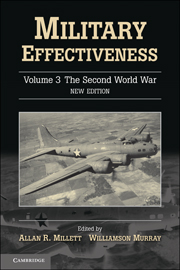Book contents
- Frontmatter
- Contents
- List of Contributors
- Introduction: Military Effectiveness Twenty Years After
- Maps
- 1 The Effectiveness of the Japanese Military Establishment in the Second World War
- 2 The United States Armed Forces in the Second World War
- 3 British Military Effectiveness in the Second World War
- 4 The Italian Armed Forces, 1940–3
- 5 The Dynamics of Volksgemeinschaft: The Effectiveness of the German Military Establishment in the Second World War
- 6 Bitter Victory: French Military Effectiveness during the Second World War
- 7 The Soviet Armed Forces in the Great Patriotic War, 1941–5
- 8 Military Effectiveness in the Second World War
- 9 Challenge and Response at the Operation and Tactical Levels, 1914–45
- 10 The Political and Strategic Dimensions of Military Effectiveness
- Index
10 - The Political and Strategic Dimensions of Military Effectiveness
Published online by Cambridge University Press: 05 June 2012
- Frontmatter
- Contents
- List of Contributors
- Introduction: Military Effectiveness Twenty Years After
- Maps
- 1 The Effectiveness of the Japanese Military Establishment in the Second World War
- 2 The United States Armed Forces in the Second World War
- 3 British Military Effectiveness in the Second World War
- 4 The Italian Armed Forces, 1940–3
- 5 The Dynamics of Volksgemeinschaft: The Effectiveness of the German Military Establishment in the Second World War
- 6 Bitter Victory: French Military Effectiveness during the Second World War
- 7 The Soviet Armed Forces in the Great Patriotic War, 1941–5
- 8 Military Effectiveness in the Second World War
- 9 Challenge and Response at the Operation and Tactical Levels, 1914–45
- 10 The Political and Strategic Dimensions of Military Effectiveness
- Index
Summary
War in the twentieth century is no longer the extension of politics by other means. It is doubtful whether the aphorism affirming that war is such an extension of politics was ever true enough to warrant the frequency with which it has been repeated. War once begun has always tended to generate a politics of its own: to create its own momentum, to render obsolete the political purposes for which it was undertaken, and to erect its own political imperatives. In the twentieth century, as the present collection of essays attests, the hypertrophy of war through war's assumption of global dimensions and almost unlimited destructiveness has led most emphatically to the emergence of war not as the servant but as the master of politics.
Twentieth-century warfare sets its own purposes. A war begun to quarantine the Austro–Hungarian Empire against the seditious activities of little Serbia among the empire's Slavic populations generates so much military and political momentum that it cannot end until all the great powers of Europe have been so completely defeated or exhausted that four centuries of European political hegemony over the rest of the world are ended. A war precipitated by American economic sanctions intended to punish Japan for its military occupation of a remote corner of southeast Asia leads to the shadowing of the globe by the threat of nuclear destruction.
In consequence of war's assumption of its own momentum and purposes, the questions to which the chapters in these volumes have addressed themselves regarding the political, strategic, operational, and tactical effectiveness of armed forces have become increasingly difficult to answer.
- Type
- Chapter
- Information
- Military Effectiveness , pp. 341 - 364Publisher: Cambridge University PressPrint publication year: 2010
- 1
- Cited by

